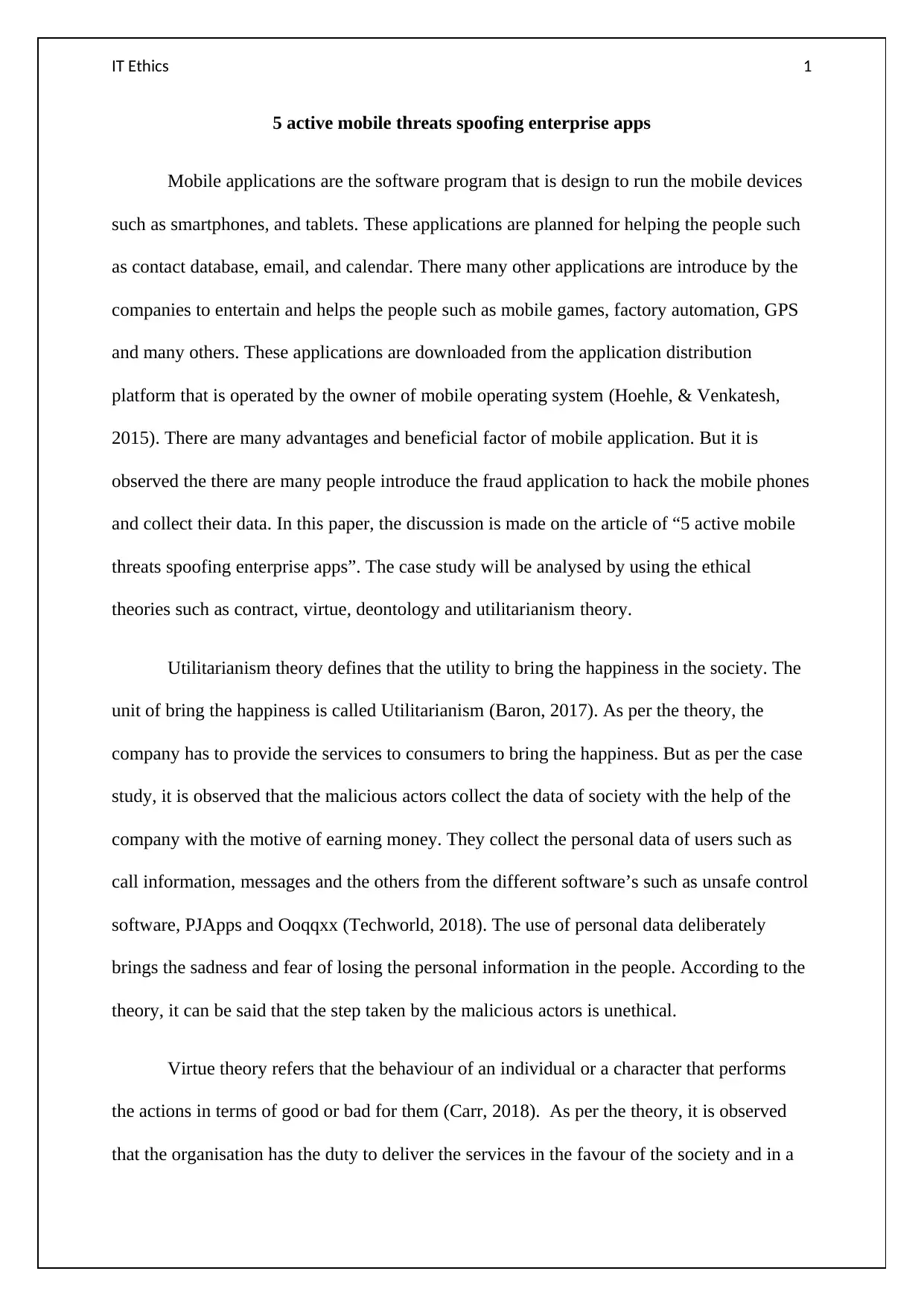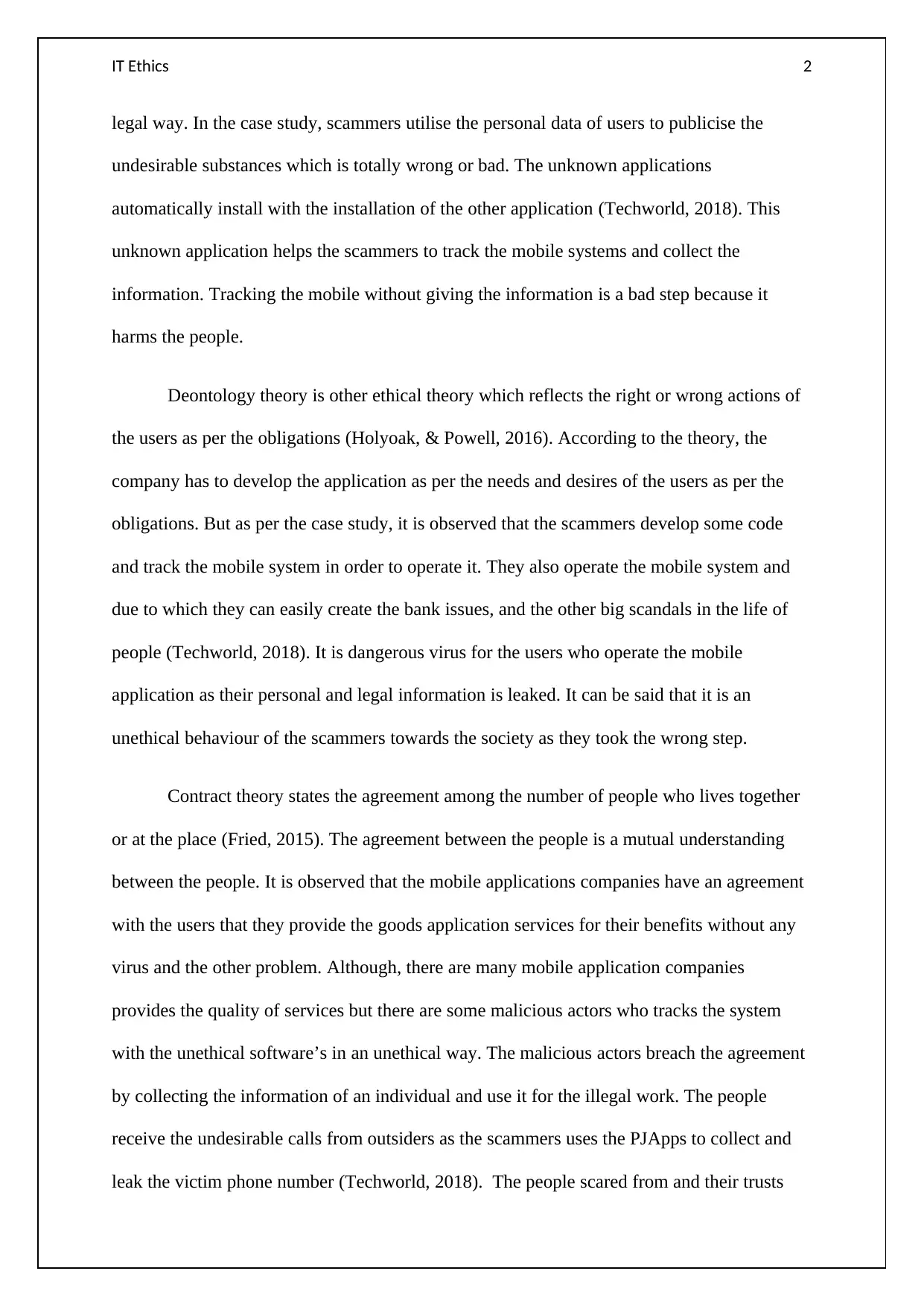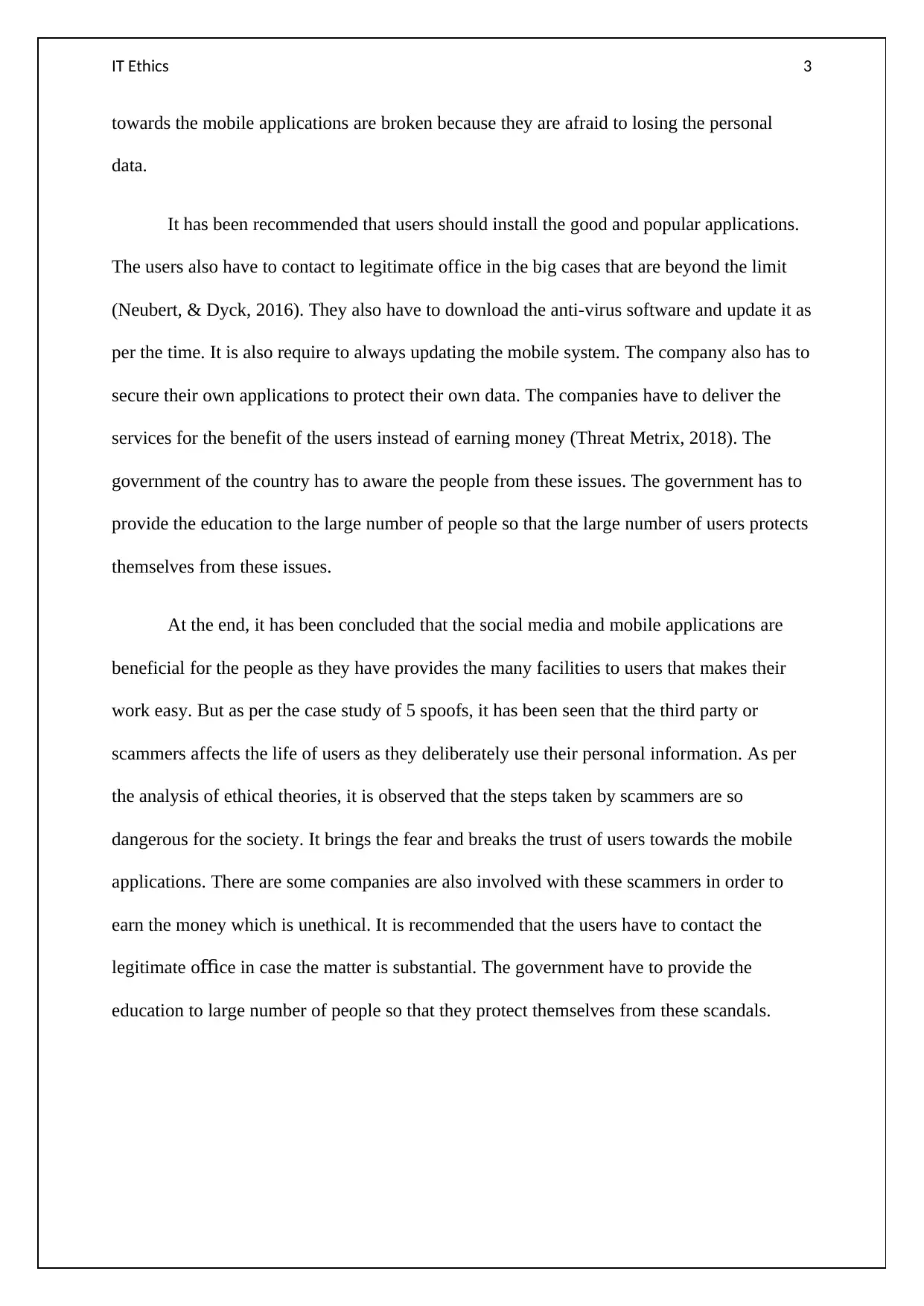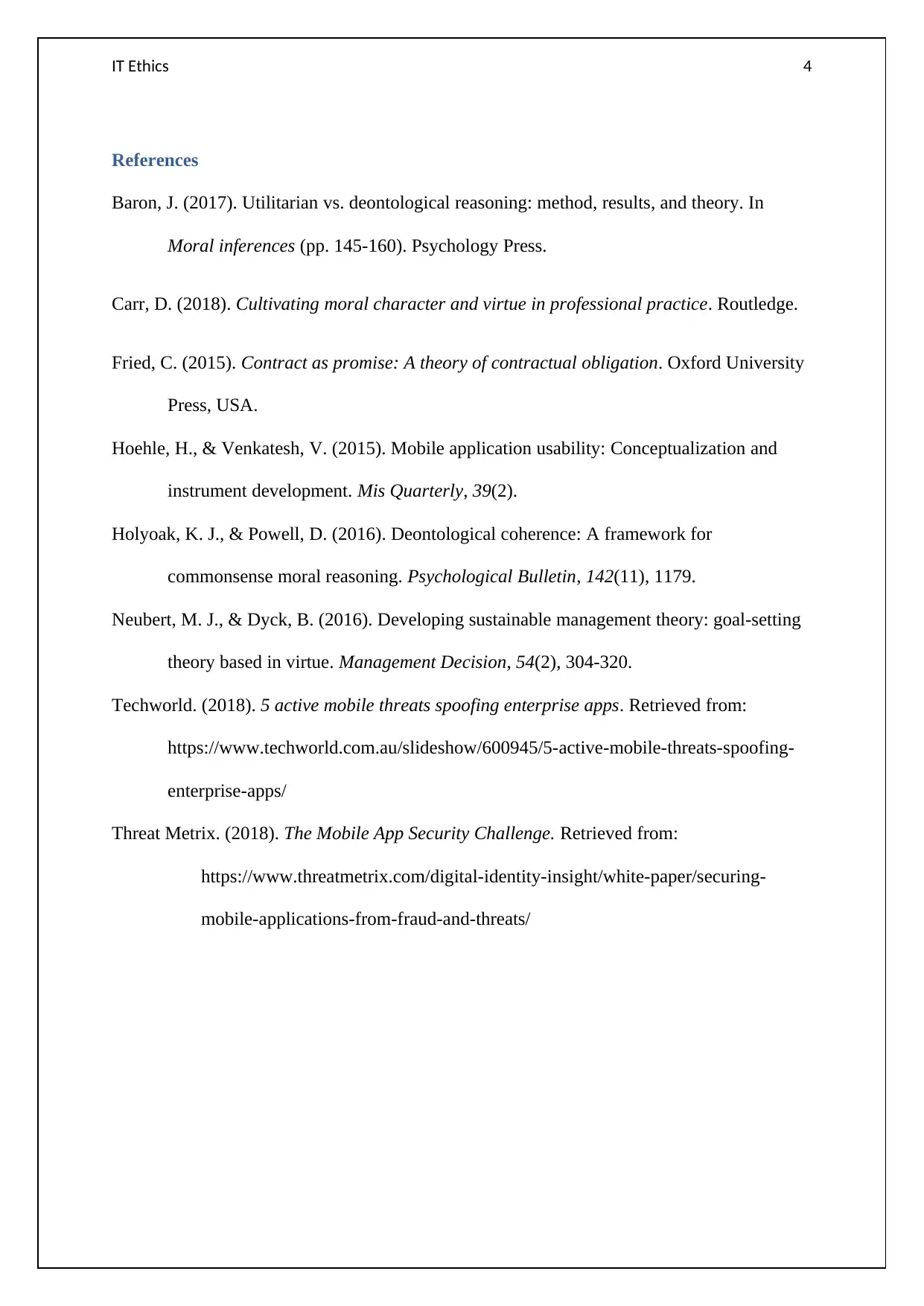IT Ethics: Analyzing Mobile Threats, Ethical Theories, and Solutions
VerifiedAdded on 2022/11/14
|5
|1337
|153
Report
AI Summary
This report examines the ethical implications of mobile threats, focusing on the article "5 active mobile threats spoofing enterprise apps." It analyzes the case study through the lens of ethical theories, including utilitarianism, virtue ethics, deontology, and contract theory. The analysis reveals how malicious actors exploit mobile applications to collect personal data, leading to privacy breaches and potential financial harm. The report highlights the unethical behavior of scammers and companies involved, emphasizing the breach of user trust and the need for improved security measures. Recommendations include user awareness, the use of reputable applications, anti-virus software, and government education initiatives. The conclusion underscores the benefits of mobile applications while cautioning against the risks associated with data breaches and the importance of ethical practices to protect users.

IT ETHICS
Paraphrase This Document
Need a fresh take? Get an instant paraphrase of this document with our AI Paraphraser

IT Ethics 1
5 active mobile threats spoofing enterprise apps
Mobile applications are the software program that is design to run the mobile devices
such as smartphones, and tablets. These applications are planned for helping the people such
as contact database, email, and calendar. There many other applications are introduce by the
companies to entertain and helps the people such as mobile games, factory automation, GPS
and many others. These applications are downloaded from the application distribution
platform that is operated by the owner of mobile operating system (Hoehle, & Venkatesh,
2015). There are many advantages and beneficial factor of mobile application. But it is
observed the there are many people introduce the fraud application to hack the mobile phones
and collect their data. In this paper, the discussion is made on the article of “5 active mobile
threats spoofing enterprise apps”. The case study will be analysed by using the ethical
theories such as contract, virtue, deontology and utilitarianism theory.
Utilitarianism theory defines that the utility to bring the happiness in the society. The
unit of bring the happiness is called Utilitarianism (Baron, 2017). As per the theory, the
company has to provide the services to consumers to bring the happiness. But as per the case
study, it is observed that the malicious actors collect the data of society with the help of the
company with the motive of earning money. They collect the personal data of users such as
call information, messages and the others from the different software’s such as unsafe control
software, PJApps and Ooqqxx (Techworld, 2018). The use of personal data deliberately
brings the sadness and fear of losing the personal information in the people. According to the
theory, it can be said that the step taken by the malicious actors is unethical.
Virtue theory refers that the behaviour of an individual or a character that performs
the actions in terms of good or bad for them (Carr, 2018). As per the theory, it is observed
that the organisation has the duty to deliver the services in the favour of the society and in a
5 active mobile threats spoofing enterprise apps
Mobile applications are the software program that is design to run the mobile devices
such as smartphones, and tablets. These applications are planned for helping the people such
as contact database, email, and calendar. There many other applications are introduce by the
companies to entertain and helps the people such as mobile games, factory automation, GPS
and many others. These applications are downloaded from the application distribution
platform that is operated by the owner of mobile operating system (Hoehle, & Venkatesh,
2015). There are many advantages and beneficial factor of mobile application. But it is
observed the there are many people introduce the fraud application to hack the mobile phones
and collect their data. In this paper, the discussion is made on the article of “5 active mobile
threats spoofing enterprise apps”. The case study will be analysed by using the ethical
theories such as contract, virtue, deontology and utilitarianism theory.
Utilitarianism theory defines that the utility to bring the happiness in the society. The
unit of bring the happiness is called Utilitarianism (Baron, 2017). As per the theory, the
company has to provide the services to consumers to bring the happiness. But as per the case
study, it is observed that the malicious actors collect the data of society with the help of the
company with the motive of earning money. They collect the personal data of users such as
call information, messages and the others from the different software’s such as unsafe control
software, PJApps and Ooqqxx (Techworld, 2018). The use of personal data deliberately
brings the sadness and fear of losing the personal information in the people. According to the
theory, it can be said that the step taken by the malicious actors is unethical.
Virtue theory refers that the behaviour of an individual or a character that performs
the actions in terms of good or bad for them (Carr, 2018). As per the theory, it is observed
that the organisation has the duty to deliver the services in the favour of the society and in a

IT Ethics 2
legal way. In the case study, scammers utilise the personal data of users to publicise the
undesirable substances which is totally wrong or bad. The unknown applications
automatically install with the installation of the other application (Techworld, 2018). This
unknown application helps the scammers to track the mobile systems and collect the
information. Tracking the mobile without giving the information is a bad step because it
harms the people.
Deontology theory is other ethical theory which reflects the right or wrong actions of
the users as per the obligations (Holyoak, & Powell, 2016). According to the theory, the
company has to develop the application as per the needs and desires of the users as per the
obligations. But as per the case study, it is observed that the scammers develop some code
and track the mobile system in order to operate it. They also operate the mobile system and
due to which they can easily create the bank issues, and the other big scandals in the life of
people (Techworld, 2018). It is dangerous virus for the users who operate the mobile
application as their personal and legal information is leaked. It can be said that it is an
unethical behaviour of the scammers towards the society as they took the wrong step.
Contract theory states the agreement among the number of people who lives together
or at the place (Fried, 2015). The agreement between the people is a mutual understanding
between the people. It is observed that the mobile applications companies have an agreement
with the users that they provide the goods application services for their benefits without any
virus and the other problem. Although, there are many mobile application companies
provides the quality of services but there are some malicious actors who tracks the system
with the unethical software’s in an unethical way. The malicious actors breach the agreement
by collecting the information of an individual and use it for the illegal work. The people
receive the undesirable calls from outsiders as the scammers uses the PJApps to collect and
leak the victim phone number (Techworld, 2018). The people scared from and their trusts
legal way. In the case study, scammers utilise the personal data of users to publicise the
undesirable substances which is totally wrong or bad. The unknown applications
automatically install with the installation of the other application (Techworld, 2018). This
unknown application helps the scammers to track the mobile systems and collect the
information. Tracking the mobile without giving the information is a bad step because it
harms the people.
Deontology theory is other ethical theory which reflects the right or wrong actions of
the users as per the obligations (Holyoak, & Powell, 2016). According to the theory, the
company has to develop the application as per the needs and desires of the users as per the
obligations. But as per the case study, it is observed that the scammers develop some code
and track the mobile system in order to operate it. They also operate the mobile system and
due to which they can easily create the bank issues, and the other big scandals in the life of
people (Techworld, 2018). It is dangerous virus for the users who operate the mobile
application as their personal and legal information is leaked. It can be said that it is an
unethical behaviour of the scammers towards the society as they took the wrong step.
Contract theory states the agreement among the number of people who lives together
or at the place (Fried, 2015). The agreement between the people is a mutual understanding
between the people. It is observed that the mobile applications companies have an agreement
with the users that they provide the goods application services for their benefits without any
virus and the other problem. Although, there are many mobile application companies
provides the quality of services but there are some malicious actors who tracks the system
with the unethical software’s in an unethical way. The malicious actors breach the agreement
by collecting the information of an individual and use it for the illegal work. The people
receive the undesirable calls from outsiders as the scammers uses the PJApps to collect and
leak the victim phone number (Techworld, 2018). The people scared from and their trusts
⊘ This is a preview!⊘
Do you want full access?
Subscribe today to unlock all pages.

Trusted by 1+ million students worldwide

IT Ethics 3
towards the mobile applications are broken because they are afraid to losing the personal
data.
It has been recommended that users should install the good and popular applications.
The users also have to contact to legitimate office in the big cases that are beyond the limit
(Neubert, & Dyck, 2016). They also have to download the anti-virus software and update it as
per the time. It is also require to always updating the mobile system. The company also has to
secure their own applications to protect their own data. The companies have to deliver the
services for the benefit of the users instead of earning money (Threat Metrix, 2018). The
government of the country has to aware the people from these issues. The government has to
provide the education to the large number of people so that the large number of users protects
themselves from these issues.
At the end, it has been concluded that the social media and mobile applications are
beneficial for the people as they have provides the many facilities to users that makes their
work easy. But as per the case study of 5 spoofs, it has been seen that the third party or
scammers affects the life of users as they deliberately use their personal information. As per
the analysis of ethical theories, it is observed that the steps taken by scammers are so
dangerous for the society. It brings the fear and breaks the trust of users towards the mobile
applications. There are some companies are also involved with these scammers in order to
earn the money which is unethical. It is recommended that the users have to contact the
legitimate o ce in case the matter is substantial. The government have to provide theffi
education to large number of people so that they protect themselves from these scandals.
towards the mobile applications are broken because they are afraid to losing the personal
data.
It has been recommended that users should install the good and popular applications.
The users also have to contact to legitimate office in the big cases that are beyond the limit
(Neubert, & Dyck, 2016). They also have to download the anti-virus software and update it as
per the time. It is also require to always updating the mobile system. The company also has to
secure their own applications to protect their own data. The companies have to deliver the
services for the benefit of the users instead of earning money (Threat Metrix, 2018). The
government of the country has to aware the people from these issues. The government has to
provide the education to the large number of people so that the large number of users protects
themselves from these issues.
At the end, it has been concluded that the social media and mobile applications are
beneficial for the people as they have provides the many facilities to users that makes their
work easy. But as per the case study of 5 spoofs, it has been seen that the third party or
scammers affects the life of users as they deliberately use their personal information. As per
the analysis of ethical theories, it is observed that the steps taken by scammers are so
dangerous for the society. It brings the fear and breaks the trust of users towards the mobile
applications. There are some companies are also involved with these scammers in order to
earn the money which is unethical. It is recommended that the users have to contact the
legitimate o ce in case the matter is substantial. The government have to provide theffi
education to large number of people so that they protect themselves from these scandals.
Paraphrase This Document
Need a fresh take? Get an instant paraphrase of this document with our AI Paraphraser

IT Ethics 4
References
Baron, J. (2017). Utilitarian vs. deontological reasoning: method, results, and theory. In
Moral inferences (pp. 145-160). Psychology Press.
Carr, D. (2018). Cultivating moral character and virtue in professional practice. Routledge.
Fried, C. (2015). Contract as promise: A theory of contractual obligation. Oxford University
Press, USA.
Hoehle, H., & Venkatesh, V. (2015). Mobile application usability: Conceptualization and
instrument development. Mis Quarterly, 39(2).
Holyoak, K. J., & Powell, D. (2016). Deontological coherence: A framework for
commonsense moral reasoning. Psychological Bulletin, 142(11), 1179.
Neubert, M. J., & Dyck, B. (2016). Developing sustainable management theory: goal-setting
theory based in virtue. Management Decision, 54(2), 304-320.
Techworld. (2018). 5 active mobile threats spoofing enterprise apps. Retrieved from:
https://www.techworld.com.au/slideshow/600945/5-active-mobile-threats-spoofing-
enterprise-apps/
Threat Metrix. (2018). The Mobile App Security Challenge. Retrieved from:
https://www.threatmetrix.com/digital-identity-insight/white-paper/securing-
mobile-applications-from-fraud-and-threats/
References
Baron, J. (2017). Utilitarian vs. deontological reasoning: method, results, and theory. In
Moral inferences (pp. 145-160). Psychology Press.
Carr, D. (2018). Cultivating moral character and virtue in professional practice. Routledge.
Fried, C. (2015). Contract as promise: A theory of contractual obligation. Oxford University
Press, USA.
Hoehle, H., & Venkatesh, V. (2015). Mobile application usability: Conceptualization and
instrument development. Mis Quarterly, 39(2).
Holyoak, K. J., & Powell, D. (2016). Deontological coherence: A framework for
commonsense moral reasoning. Psychological Bulletin, 142(11), 1179.
Neubert, M. J., & Dyck, B. (2016). Developing sustainable management theory: goal-setting
theory based in virtue. Management Decision, 54(2), 304-320.
Techworld. (2018). 5 active mobile threats spoofing enterprise apps. Retrieved from:
https://www.techworld.com.au/slideshow/600945/5-active-mobile-threats-spoofing-
enterprise-apps/
Threat Metrix. (2018). The Mobile App Security Challenge. Retrieved from:
https://www.threatmetrix.com/digital-identity-insight/white-paper/securing-
mobile-applications-from-fraud-and-threats/
1 out of 5
Related Documents
Your All-in-One AI-Powered Toolkit for Academic Success.
+13062052269
info@desklib.com
Available 24*7 on WhatsApp / Email
![[object Object]](/_next/static/media/star-bottom.7253800d.svg)
Unlock your academic potential
Copyright © 2020–2026 A2Z Services. All Rights Reserved. Developed and managed by ZUCOL.




